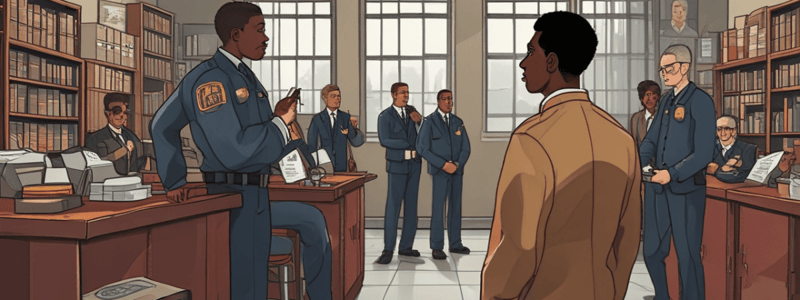Podcast
Questions and Answers
Who is typically authorized to release information to the public about an arrest or ongoing investigation?
Who is typically authorized to release information to the public about an arrest or ongoing investigation?
- The arresting officer
- The public information officer (correct)
- Any officer on the scene
- The patrol vehicle driver
What should you do if you encounter someone recording the incident on their mobile device?
What should you do if you encounter someone recording the incident on their mobile device?
- Ask them to delete the footage
- Confiscate the device
- Ignore and continue with your duties
- Interfere only if they are obstructing the investigation (correct)
Why is it important to maintain physical control of the arrestee during the escort?
Why is it important to maintain physical control of the arrestee during the escort?
- To prevent the arrestee from speaking to the media
- To conduct a final search for contraband
- To ensure the arrestee does not escape or fall (correct)
- To intimidate bystanders
Before placing an arrestee in the transport vehicle, what must you ensure?
Before placing an arrestee in the transport vehicle, what must you ensure?
Which procedure is required every time custody of the arrestee is transferred from one officer to another?
Which procedure is required every time custody of the arrestee is transferred from one officer to another?
Where is the arrestee typically seated in the transport vehicle?
Where is the arrestee typically seated in the transport vehicle?
What feature of the transport vehicle should be disabled to prevent escape?
What feature of the transport vehicle should be disabled to prevent escape?
What action may your agency require to protect against misconduct charges during transport?
What action may your agency require to protect against misconduct charges during transport?
What is the maximum amount of time a juvenile can be held in a secure booking area of an adult jail?
What is the maximum amount of time a juvenile can be held in a secure booking area of an adult jail?
Juveniles in adult jails are typically waiting for which of the following?
Juveniles in adult jails are typically waiting for which of the following?
What must you do if the arrestee is a juvenile with a medical condition or mental illness?
What must you do if the arrestee is a juvenile with a medical condition or mental illness?
Before releasing a juvenile from custody, who must assume responsibility for them?
Before releasing a juvenile from custody, who must assume responsibility for them?
Which office is responsible for verifying a juvenile's legal adult status?
Which office is responsible for verifying a juvenile's legal adult status?
What information must be provided to the booking officer regarding the arrestee?
What information must be provided to the booking officer regarding the arrestee?
How should a juvenile be placed in an adult facility if temporary custody is necessary?
How should a juvenile be placed in an adult facility if temporary custody is necessary?
What additional information must be communicated to the booking officer if the arrestee is a juvenile?
What additional information must be communicated to the booking officer if the arrestee is a juvenile?
What should you do immediately after informing the suspect they are under arrest?
What should you do immediately after informing the suspect they are under arrest?
What informs the process of handling personal property and contraband?
What informs the process of handling personal property and contraband?
Why may additional charges apply during an arrest situation?
Why may additional charges apply during an arrest situation?
When is it necessary to provide information to the arrestee's family?
When is it necessary to provide information to the arrestee's family?
What is a crucial aspect during the arrest procedure to ensure it is positive?
What is a crucial aspect during the arrest procedure to ensure it is positive?
What is prohibited from being released to the public after an arrest?
What is prohibited from being released to the public after an arrest?
What must be done with any evidence found during a search?
What must be done with any evidence found during a search?
Why are Miranda requirements necessary?
Why are Miranda requirements necessary?
Under what conditions can restraints be used on an incarcerated pregnant person in labor?
Under what conditions can restraints be used on an incarcerated pregnant person in labor?
What is the first action to take when arriving at a destination with an arrestee?
What is the first action to take when arriving at a destination with an arrestee?
Where should weapons be secured upon arrival at a detention facility?
Where should weapons be secured upon arrival at a detention facility?
What should be maintained during the escort of the arrestee into the facility?
What should be maintained during the escort of the arrestee into the facility?
What should you do after transporting an arrestee in your vehicle?
What should you do after transporting an arrestee in your vehicle?
Who specifies the acceptable locations to store weapons at the detention facility?
Who specifies the acceptable locations to store weapons at the detention facility?
What should you gather before removing the arrestee from the patrol vehicle?
What should you gather before removing the arrestee from the patrol vehicle?
What types of hazards might be present in secured facilities?
What types of hazards might be present in secured facilities?
What should be transferred to the booking officer by the transporting officer?
What should be transferred to the booking officer by the transporting officer?
What document must the arresting officer complete?
What document must the arresting officer complete?
Which of the following information is NOT required to be recorded by the booking officer?
Which of the following information is NOT required to be recorded by the booking officer?
From where does FCIC/NCIC receive criminal history data?
From where does FCIC/NCIC receive criminal history data?
Which must be done after turning over the arrestee and arrest affidavit to the booking officer?
Which must be done after turning over the arrestee and arrest affidavit to the booking officer?
Why is it important to complete the FCIC/NCIC information accurately?
Why is it important to complete the FCIC/NCIC information accurately?
What should be done with all evidence and seized contraband?
What should be done with all evidence and seized contraband?
What should documents related to arrests clearly convey?
What should documents related to arrests clearly convey?
When can you transport a juvenile and an adult arrestee in the same vehicle?
When can you transport a juvenile and an adult arrestee in the same vehicle?
What should you do if an arrestee needs medical attention during transport?
What should you do if an arrestee needs medical attention during transport?
What is an important consideration when transporting an arrestee with a service animal?
What is an important consideration when transporting an arrestee with a service animal?
When transporting a pregnant arrestee, how might you need to adjust their restraints?
When transporting a pregnant arrestee, how might you need to adjust their restraints?
What should you consider if you cannot transport the arrestee immediately due to weather conditions?
What should you consider if you cannot transport the arrestee immediately due to weather conditions?
In which situation might you need to request a larger transport vehicle or an ambulance?
In which situation might you need to request a larger transport vehicle or an ambulance?
What should you do if an arrestee appears to be under the influence during arrest?
What should you do if an arrestee appears to be under the influence during arrest?
When en route with an arrestee, which situation is NOT a cause for interruption?
When en route with an arrestee, which situation is NOT a cause for interruption?
Flashcards are hidden until you start studying
Study Notes
Juvenile Considerations
- A juvenile can be taken to a secure booking area of a jail or an adult jail for temporary custody for no more than six hours, or for fingerprinting and photographing, as long as they are out of the sight and hearing of adult arrestees.
- Exceptions apply to a juvenile charged as an adult, or when the court has emancipated or adjudicated the juvenile as an adult.
- Verify a juvenile's legal adult status through the Department of Juvenile Justice, court records, or criminal histories.
- You are responsible for a juvenile who has a medical condition, a mental illness, or the effects of substance misuse.
- You are also responsible until a parent, a guardian, or a representative of the Department of Children and Families assumes responsibility.
Entering the Detention Facility
- Booking or intake officers at the county jail have their own policies and procedures, which you must know and follow.
- Inform the booking officer of the charges against the arrestee, any injuries, and if the arrestee is a juvenile.
- Also, inform them if the arrestee was contaminated with pepper spray, if a conducted electric weapon was used, or if they made threats to self or others, or have known medical conditions.
Escorting and Preparing for Transport of an Arrestee
- People near the scene may be recording the incident, which is not a criminal offense, and you cannot interfere unless they are actively obstructing the investigation.
- A designated public information officer (PIO) is responsible for releasing information to the media.
Escorting the Arrestee to the Patrol Vehicle
- Use escort techniques to maintain physical control of the arrestee during the entire escort.
- Never assume the arrestee has already been searched before placing them in the transport vehicle.
- Conduct another search and secure all personal property, evidence, or contraband every time custody of the arrestee is transferred.
Preparation for Transport
- Make sure the window controls and door handles are disabled from the rear compartment to prevent escape or damage.
- Clear the rear passenger compartment of any drugs, weapons, or equipment.
- Thoroughly search the handcuffed arrestee and take immediate possession of all personal property, evidence, and contraband.
- Assist the arrestee into the transport vehicle and secure their seat belt.
Transporting an Incarcerated Pregnant Person
- According to the Healthy Pregnancy for Incarcerated Women Act, restraints should not be used for an incarcerated pregnant person in labor, delivery, or postpartum recovery, unless they present a substantial flight risk or extraordinary medical or security circumstances.
Arrival at the Destination
- Notify dispatch and report the ending vehicle mileage.
- Approach the appropriate drop-off point and obtain clearance to enter.
- Secure your weapons in a locked location, such as the patrol vehicle's trunk, a weapons locker, or a lockbox at the drop-off point.
Entering a Secured Facility
- Gather all personal property taken from the arrestee and safely remove them from the patrol vehicle.
- Maintain physical control of the arrestee during escort into the facility.
- Use verbal commands and physical direction.
- You are responsible for the arrestee until facility staff receives them.
Specific Transport Situations
- You cannot transport a juvenile in the same vehicle with an adult arrestee unless they are codefendants.
- Notify dispatch when transporting an arrestee needing medical attention to a medical facility or if you have requested EMS.
- Adjust transport procedures when transporting an arrestee with a disability or specific need, without compromising officer safety.
- Consider weather conditions and temperature if you cannot transport the arrestee immediately after loading.
Booking Officer Responsibilities
- The transporting officer must give the booking officer any personal property previously removed from the arrestee.
- The arresting officer must complete an arrest affidavit, which must accompany the arrestee to the booking officer.
Booking Procedures
- The booking officer processes the arrestee, including fingerprinting, photographing, and inventorying personal property for safe keeping until the arrestee is released.
- The following information should be recorded: name, race, sex, date of birth, Social Security Number, criminal charges, and case number.
Studying That Suits You
Use AI to generate personalized quizzes and flashcards to suit your learning preferences.





